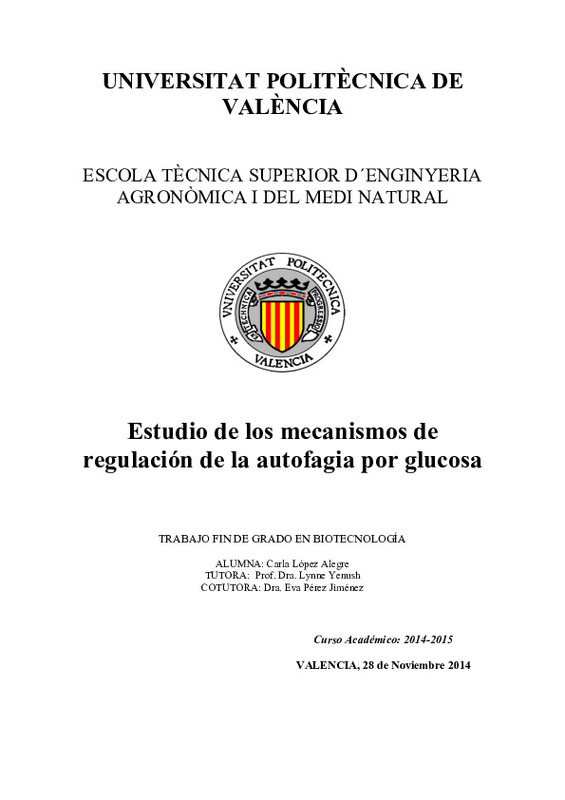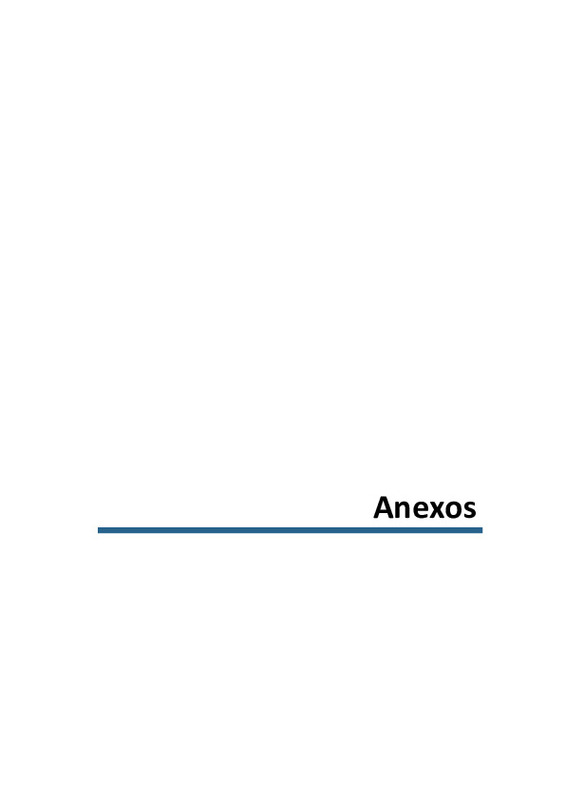JavaScript is disabled for your browser. Some features of this site may not work without it.
Buscar en RiuNet
Listar
Mi cuenta
Estadísticas
Ayuda RiuNet
Admin. UPV
Estudio de los mecanismos de regulación de la autofagia por glucosa
Mostrar el registro sencillo del ítem
Ficheros en el ítem
| dc.contributor.advisor | Yenush, Lynne Paula
|
es_ES |
| dc.contributor.advisor | Pérez Jiménez, Eva
|
es_ES |
| dc.contributor.author | López Alegre, Carla
|
es_ES |
| dc.date.accessioned | 2015-07-16T13:57:03Z | |
| dc.date.available | 2015-07-16T13:57:03Z | |
| dc.date.created | 2014-12-19 | |
| dc.date.issued | 2015-07-16 | es_ES |
| dc.identifier.uri | http://hdl.handle.net/10251/53324 | |
| dc.description.abstract | [ES] La degradación intracelular de proteínas es un proceso catabólico clave para la supervivencia celular frente a cambios ambientales. Este proceso degradativo tiene como función principal la eliminación de proteínas mal plegadas, que pueden ser tóxicas al acumularse, o la eliminación de proteínas que no son útiles en ciertas situaciones, para conseguir una rápida adaptación al medio. Los productos de esta degradación son los aminoácidos, que serán utilizados para la síntesis de nuevas proteínas o para la obtención de energía. Existen dos vías de degradación intracelular de proteínas: la vía independiente y la vía dependiente de lisosomas. Dentro de esta última, uno de los principales mecanismos es la macroautofagia (denominada comúnmente autofagia para simplificar), que consiste en la formación de unas estructuras de doble membrana que se cierran secuestrando material citoplasmático, denominadas autofagosomas, que posteriormente se fusionan con endosomas y lisosomas dando lugar a los aut | es_ES |
| dc.description.abstract | [EN] Protein degradation is a key catabolic process for cell survival in response to environmental changes. The main function of protein degradation is the removal of unfolded protein, which accumulation may be toxic, or useless proteins, providing a quickly environmental adaptation. The products of that degradation are amino acids that are reused for the synthesis of new proteins or are metabolized for energy obtaining. There are two protein degradation mechanisms: lysosomal-dependent pathway and lysosomal-independent pathway. One of the main mechanisms in the lysosomal dependent pathway is macroautophagy (called autophagy here after to simplify). Autophagy consists in formation of a double membrane that will close sequestering cytoplasmic portions. These double membrane structures, called autophagosomes, will ultimately fuse with endosomes and lysosomes forming autolysosomes. Lysosomal enzymes, which contain autolysosomes, will degrade the engulfed material. Autophagy is a highly regulated process. Upon nutrient deprivation, such as amino acids, autophagy is induced to provide necessary requirements to cell survival. On the other hand, presence of amino acids suppresses autophagy. However, glucose, that is other nutrient, regulates the process in an opposite way. It has been demonstrated that addition of glucose to mammalian cells after a starvation period induces autophagy. This induction, surprisingly, is mTOR and AMPK-independent and p38 MAPK-dependent. p38 MAPK translocates to the nucleus in the presence of glucose suggesting a role in the regulation of gene expression. The main objective of this work is to determine p38 MAPK regulated-genes that may be implicated in autophagy induction by glucose. To this end, we analysed a PCR Array data where MEFs cells p38+/+ and p38-/- in the presence or absence of glucose were compared, and we selected four candidate genes: Rgs19, Bcl2, Ifna4 y Akt1. Then, we study their expression pattern by qPCR experiments in NIH/3T3 and HEK293T cells, in presence or absence of glucose. No changes were observed in BCL2 and AKT1 expression, whereas RGS19 expression decreased in presence of glucose, maintaining these differences in expression when p38 MAPK was inhibited. These data suggest a p38 MAPK independent expression of RGS19. Based on the aforementioned results, IFNA4 expression significantly increased in presence of glucose only when p38 MAPK was inhibited, so it is not possible to connect IFNA4 and autophagy induction. However, it should be pointed out that there is a possible regulation between IFNA4 and kinase p38, independently on its role in autophagy. Furthermore, we analysed possible mechanisms implicated in p38 MAPK activation. Our results show an increase in reticulum endoplasmic stress in presence of glucose, correlating with activated p38. | es_ES |
| dc.language | Español | es_ES |
| dc.publisher | Universitat Politècnica de València | es_ES |
| dc.rights | Reserva de todos los derechos | es_ES |
| dc.subject | Reticulum stress | es_ES |
| dc.subject | Transcription | es_ES |
| dc.subject | Glucose | es_ES |
| dc.subject | Autophagy | es_ES |
| dc.subject | Autofagia | es_ES |
| dc.subject | Glucosa | es_ES |
| dc.subject | P38 MAPK | es_ES |
| dc.subject | Transcripción | es_ES |
| dc.subject | Estrés de retículo | es_ES |
| dc.subject.classification | BIOQUIMICA Y BIOLOGIA MOLECULAR | es_ES |
| dc.subject.other | Grado en Biotecnología-Grau en Biotecnologia | es_ES |
| dc.title | Estudio de los mecanismos de regulación de la autofagia por glucosa | es_ES |
| dc.type | Proyecto/Trabajo fin de carrera/grado | es_ES |
| dc.rights.accessRights | Abierto | es_ES |
| dc.contributor.affiliation | Universitat Politècnica de València. Escuela Técnica Superior de Ingeniería Agronómica y del Medio Natural - Escola Tècnica Superior d'Enginyeria Agronòmica i del Medi Natural | es_ES |
| dc.contributor.affiliation | Universitat Politècnica de València. Departamento de Biotecnología - Departament de Biotecnologia | es_ES |
| dc.description.bibliographicCitation | López Alegre, C. (2014). Estudio de los mecanismos de regulación de la autofagia por glucosa. http://hdl.handle.net/10251/53324. | es_ES |
| dc.description.accrualMethod | TFGM | es_ES |
| dc.relation.pasarela | TFGM\22159 | es_ES |
Este ítem aparece en la(s) siguiente(s) colección(ones)
-
ETSIAMN - Trabajos académicos [3545]
Escuela Técnica Superior de Ingeniería Agronómica y del Medio Natural







